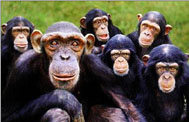Humans, chimps may have bred after split
One of the most detailed comparisons yet of human and chimp DNA shows that the split between the two species was a long, messy affair that may even have featured an unusual evolutionary version of breakup sex.

Previous genetic research has shown that chimpanzees and humans are sister species, having split off from a common ancestor about 7 million years ago. The new study goes farther by looking at approximately 800 times more DNA than earlier efforts. That additional data make it possible to determine not just when, but how the split happened, reports Forbes.
According to Reuters, after comparing the genomes, or genetic codes, of the two species they suggest the initial split took place no more than 6.3 million years ago and probably less than 5.4 million years ago.
The process of separation may have taken about 4 million years and there could have been some inter-breeding before the final break.
"The study gave unexpected results about how we separated from our closest relatives, the chimpanzees," said David Reich of the Broad Institute and Harvard Medical School's Department of Genetics in Massachusetts.
Instead of analyzing genetic differences between humans and chimpanzees, Reich and researchers from the Massachusetts Institute of Technology (MIT) and the Broad Institute of Harvard and MIT looked at variations in the degree of divergence between the two in different regions of the genomes.
Dr Reich and his colleagues looked at the variation in evolutionary history across the genomes of humans and chimps. They found that the time from the beginning to the completion of divergence between the two species ranges over more than four million years, much longer than expected. In particular, the study found that the X chromosome - which occurs twice in women and once in men - is the youngest part of the genome and was still being modified just before the final split occurred.
"A hybridisation event between human and chimpanzee ancestors could help to explain both the wide range of divergence times seen across our genomes as well as their relatively similar X chromosomes," Dr Reich said. "That such evolutionary events have not been seen more often in animal species may simply be due to the fact that we have not been looking for them," informs Independent.
O.Ch.Subscribe to Pravda.Ru Telegram channel, Facebook, RSS!


